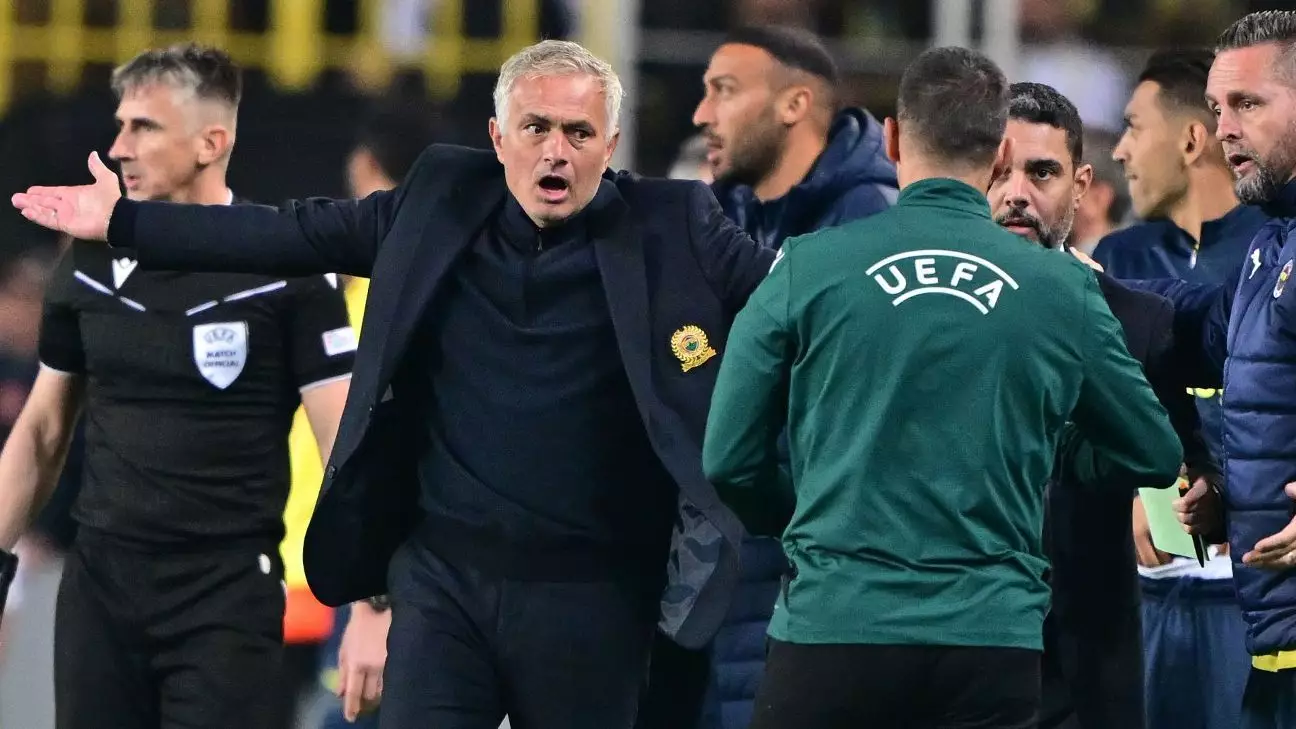Jose Mourinho, a name synonymous with both success and controversy, has once again found himself at the center of European football’s fierce political game. Following the 2023 Europa League final, where his Roma side faced a heart-wrenching defeat to Sevilla, Mourinho’s sentiments regarding the treatment he has received from UEFA have turned decidedly critical. His outright claims of feeling singled out suggest that the former Chelsea and Manchester United coach believes there is a pattern of scrutiny directed at him—a narrative that paints him not merely as a combative character, but as someone grappling with perceived institutional bias.
When discussing the disciplinary actions following the final in Budapest, where Mourinho was handed a four-match touchline ban due to his incendiary comments directed at referee Anthony Taylor, one cannot help but sense the depth of his frustration. In a recent interview with Sky Sports, Mourinho articulated his feelings: “Since that Budapest final it’s getting difficult.” This claim of difficulty reflects not just personal setbacks but also a sense that he is being judged under a harsher lens compared to other coaches. The question arises: is this a case of paranoia or a genuine grievance deserving of consideration?
Mourinho’s arguments extend beyond his own experiences. He proactively asserts that fairness should prevail in the adjudication of all managerial personalities, regardless of stature or reputation. “I deserve to be treated like everybody else,” he implores, making a case for a level playing field that echoes through the annals of competitive sports. His assertion resonates especially in a world so often defined by hierarchy; indeed, the expectation is that standards should not bend according to the fame of the individual involved.
By drawing parallels between the accountability of coaches and players—illustrating that it should not matter if one is a world-renowned figure like Lionel Messi or a novice in their first match—Mourinho touches on an essential doctrine of sportsmanship. The essence of competition posits that every participant should be held to the same set of rules and standards. This principle, however, is often obscured in the high-stakes environment of professional football, where fame and reputation sometimes supersede merit and adherence to authority.
In a twist reflecting his characteristic wit, Mourinho recently mentioned that any future managerial roles in England would not involve teams fighting relegation battles. The levity in his statement, albeit clear in intent, also underscores a certain confidence. Here is a strategist who knows his worth and prefers the path of challenges befitting his storied career—championship fights over relegation skirmishes.
That said, it reflects a broader apprehension about the emotional toll that relegation struggles can inflict on players, coaches, and clubs alike. “It has to be very hard emotionally,” he observes. The mental health of players and staff in dire scenarios can often be an overlooked aspect within the footballing community. His appreciation for those grappling with relegation battles, describing them as “brave guys,” underscores a respect that belies his usual combative exterior.
Throughout this dialogue about fairness, and his candid reflections on the emotional state of his career, Mourinho’s longing for a return to the Premier League stands out. London, often referred to as home, beckons him, marked by nostalgia for past successes. Yet, the irony isn’t lost; while he yearns for the bright lights of the Premier League, his readiness to step into the fray isn’t as strong as it once was. “One day I would like to go back,” he muses.
This air of uncertainty surrounding his future poses broader questions about the legacies we leave behind in professional sports. For a personality like Mourinho, whose career has oscillated between awe-inspiring success and polarizing controversies, the desire for redemption and recognition remains an evergreen topic. One cannot help but ponder what awaits him next in his odyssey, as he navigates the complex currents of football management while advocating for respect and fair treatment within the sport he loves.
